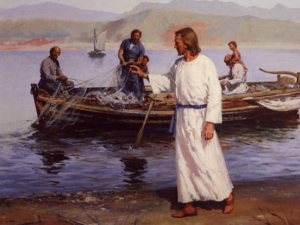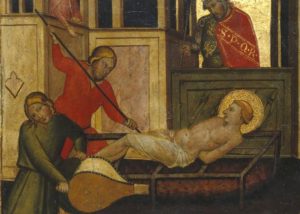There is no shortage of waiting in life. Waiting for the weekend. Waiting to find out if you got that new job. Waiting to find out if you made the team. Waiting to hear the test results from the doctor. Waiting to get a driver’s license. Waiting to hear from colleges. Let’s face it: our days are packed with family obligations, work, school, sports and Netflix. But there is also a great deal of waiting in the midst of all the activity. Read More
Deacon Allen | Deacon Allen Tatara Catholic Speaker - Part 19
On the Inside; On the Outside
 What does it take to be great? According to the Lord, it takes humility. “The Lord is gracious and merciful; slow to anger, and of great kindness.”(Ps 145:8) Let’s dive into these four attributes.
What does it take to be great? According to the Lord, it takes humility. “The Lord is gracious and merciful; slow to anger, and of great kindness.”(Ps 145:8) Let’s dive into these four attributes.
The Lord is gracious. The Christmas story is powerful because it is gracious. The Creator of the Universe, the One who is not like us, became one of us so that He could be one with us. This story is retold in many different ways. I think back to the movie, “Avatar.” A man traveled to another world. He became one of them. He fell in love with them. He was willing to die for them. He saved them from the evil ones. He was betrayed and nearly killed by his own. Sound familiar? There is no more gracious God then the Lord who became one of us.
The Lord is merciful. What does mercy mean? It means getting filthy, downright dirty, for another. It means sticking your hand into something slimy and gooey to help someone. For example: a bus driver who stopped to rescue two families from a burning house – and went on to finish his route; a grad student who lost her leg in an earthquake in Haiti, then returned to the country to build a school; a woman who donated her kidney to a Facebook friend. The Lord defined what mercy truly means: to do something beautiful, unexpectedly. The Lord is merciful because he gets right into it!
The Lord is slow to anger. We know what this means. We have all experienced it. We are all recipients of it. We live, breath, smile and give a big sigh of relief because the Lord turned the other cheek. Who would tell us the truth without fear of being rejected, rebuked or ridiculed? Only the Lord does not fear being hurt by our feelings. The Lord is slow to anger because He is rich in kindness.
The Lord is great in kindness. He gives what we need. He takes what we give. The difference between the two is immense. He gives us His Son. What do we give Him? For this reason, the Lord is great in kindness.
Let us imitate the Lord by living these four great attributes. Our God is amazing, full of humility and love. There is none greater!
A little more than a week ago, Stephanie and I took a group of high school teens from our parish to NCYC, or the National Catholic Youth Conference in Indianapolis, Indiana. Together, we were part of the 25,000 teens in attendance for this three day conference.
Our teens heard some of the top Catholic speakers and musicians as they played and prayed throughout the weekend. And they were all in agreement that the Friday night adoration was extremely powerful and moving. (Try to imagine 25,000 + in complete and total silence before the Blessed Sacrament. It was a true spiritual experience.)
The theme of the conference was “Called.” And the message was simple: each of us is being called by God for greater things. This is also the message of our Gospel today (MT 4:18-22).
 Andrew, Simon, James and John were fishing – just doing what they always do – when they received the call from Jesus. They were asked to follow Jesus and be fishers of men.
Andrew, Simon, James and John were fishing – just doing what they always do – when they received the call from Jesus. They were asked to follow Jesus and be fishers of men.
We too, are fishers of people. Each of us is also being called to do great things in God’s name. We are called to follow Christ and to then lead by example through loving and serving others. We are called to be saints so that all may see, through us, the goodness of God.
As our teens learned, each of us receives God’s call every single day, right where we are. This can be a scary thing. But we need to remember that we never fish alone; for we are always accompanied by the One who constantly calls us to do great things in His name.
 Today we remember those who have passed from this life with faith, hope and trust in the promise of eternal life. Life is a gift from God and nothing that God gives or does is ever wasted. And let us always remember that each of us is a beloved child of God.
Today we remember those who have passed from this life with faith, hope and trust in the promise of eternal life. Life is a gift from God and nothing that God gives or does is ever wasted. And let us always remember that each of us is a beloved child of God.
Our lives are a reflection of God and his love. Those who have passed whom we remember today somehow reflected that love. Sadness, sorrow, and grief may fill us today, but that is a reminder of their presence and love in our lives.
While we still mourn, we are confident that our loved ones are enjoying the peace, comfort and joy of eternal life. All Souls’ Day is a great reminder for each of us that we are given the gift of life.
So we pray today for our deceased parents, spouses, children, relatives, and friends. We want them to be capable of receiving the full bounty of God’s love; so we pray for them in our daily prayers.
All Souls’ Day touches us personally. Yes, it is a day of mixed emotions. It is our day to remember, to miss, but also to be joyful. We also reflect on our own existence. Each of us is a soul…a soul on a journey. We are still walking on that journey to become all that we were meant to be – a child of God enjoying eternal life with him.
“I will not reject anyone who comes to me,” the Lord said in our gospel today (John 6:37-40). We trust in the God who loves us – to care for us and our loved ones in life and in death. And so we pray, “May the souls of the faithful departed through the mercy of God rest in peace. Amen.”
Today, Jesus teaches that we should pray with persistence (Luke 11:5-13). Of course, the question comes to mind: if God is such a loving and caring parent who will only give “good” things to us, why do we have to persist in asking? Why do we have to ask at all? The reason is not because God needs persuading. Persistence in prayer is for our benefit. Read More
We don’t much like tax collectors today. But in first century Israel, they were held in even lower regard. Many of them were corrupt – lining their own pockets in a way that would make Illinois politicians look like saints. And worse – they were collecting taxes for Rome. The enemy – who not only occupied their land but defiled it by their presence, their idols and their false gods. Tax collectors were the sorts of people drug dealers wouldn’t let their kids hang out with. Read More
During deacon formation, I was required to read the Catechism of the Catholic Church for one of my classes. While reading this document, I came across a beautiful prayer from St. Nicholas of Flue. It is a prayer that has become one of my favorites and it is one that I often use when I give talks at other parishes. This is the prayer:
My Lord and my God, take from me everything that distances me from you.
My Lord and my God, give me everything that brings me closer to you.
My Lord and my God, detach me from myself to give my all to you.
This prayer continues to touch me every time I read it. It is very simple, yet hits me where I need it the most. It’s about transforming my thinking from being about “me” to being about the One who made me. It’s about placing our focus on serving the Lord without getting caught up in the distractions of our world.
This is an extremely powerful prayer and yet it’s a very difficult prayer. Why? Because we tend to make things about ourselves – and we often get wrapped up with our own drama. When we place all of our thoughts, actions and energies toward ourselves – everything about me and what I want, there is simply no room for God. We in fact become our own God.
But when we take the time to center ourselves and refocus on our one true God, our perspective slowly begins to change. We become less self-centered and more Christ-centered.
When we allow God to “re-become” the center of our lives, everything simply falls into place. It’s just like St. Teresa of Jesus wrote:
Let nothing trouble you. Let nothing frighten you.
Everything passes. God never changes. Patience obtains all.
Whoever has God wants for nothing. God alone is enough.
Just the other day I was flipping through TV channels and came across a show about a guy who picks up road kill for a living. I thought, “Why in the world would anyone want to watch this?” And then, of course, I couldn’t turn it off! That show was called “Dirty Jobs,” and Mike Rowe was the man who became famous for trying some of the dirtiest jobs on the planet. He has waded through sewers, castrated horses, farmed worm poop, and sorted through medical waste, just to name a few. He goes out and learns about the jobs that none of us would ever want to do, and gets coached by the people who do these jobs every day for a living. It’s not just for entertainment, because Mike goes deeper in order to pay respect to the men and women who roll up their sleeves and do these challenging jobs every day. Read More
 Saint Lawrence was one of seven deacons who were in charge of giving help to the poor and the needy. When a persecution broke out in the year 258, Pope St. Sixtus was condemned to death. As he was led to execution, Lawrence followed him weeping, “Father, where are you going without your deacon?” The Pope answered, “I am not leaving you, my son. In three days you will follow me.” Full of joy, Lawrence gave to the poor the rest of the money he had on hand and even sold expensive vessels to have more to give away.
Saint Lawrence was one of seven deacons who were in charge of giving help to the poor and the needy. When a persecution broke out in the year 258, Pope St. Sixtus was condemned to death. As he was led to execution, Lawrence followed him weeping, “Father, where are you going without your deacon?” The Pope answered, “I am not leaving you, my son. In three days you will follow me.” Full of joy, Lawrence gave to the poor the rest of the money he had on hand and even sold expensive vessels to have more to give away.
The Prefect of Rome, a greedy pagan, thought the Church had a great fortune hidden away. So he ordered Lawrence to bring the Church’s treasure to him. Lawrence said he would – in three days. Then he went through the city and gathered together all the poor, the sick, the blind, lepers, widows and orphans. When he showed them to the Prefect and said: “This is the Church’s treasure!”
In great anger, the Prefect condemned Lawrence to a slow, cruel death. Lawrence was tied on top of an iron grill over a slow fire that roasted his flesh little by little, but he was burning with so much love of God that he almost did not feel the flames. In fact, God gave him so much strength and joy that he even joked, “Turn me over, I’m done on this side!” And just before he died, he said, “It’s cooked enough now.” Then he prayed that Rome might be converted to Jesus and that the Catholic faith might spread all over the world.
Today, St. Paul tells us that whoever sows sparingly will also reap sparingly, and whoever sows bountifully will also reap bountifully (Corinthians 9:6-10) . St. Lawrence understood this and it led him to realize these two simple truths: that God is able to make every grace abundant for each one of us, and that God loves a cheerful giver.
May each of us burn with the fire of Christ’s love so that we can readily serve our Father and others with honor, joy, and holy humor.
 For some reason, I woke up this morning not praising God, but judging others. You may think that this is difficult because I haven’t even “seen” anyone yet. But for some reason, I was judging these people in my mind. I’m not really sure where this comes from, but this happens far more than I care to admit.
For some reason, I woke up this morning not praising God, but judging others. You may think that this is difficult because I haven’t even “seen” anyone yet. But for some reason, I was judging these people in my mind. I’m not really sure where this comes from, but this happens far more than I care to admit.
I often get this thought in my head that people don’t fit into the mold that I am trying to put them into. As I sit here writing this, I realize how terrible this action is. I am trying to make these people something they’re not. I am forcing my rules of living onto others, and they don’t even know that I am doing it. I am judging people according to my thoughts and beliefs. I am finally starting to realize when I am doing this, and I try to realign my thoughts as soon as possible. I was not placed on this earth to judge. That is not my job. God will judge – not me! My role is to love and serve the Lord and others each and everyday. I shall not judge because I have many obstacles of my own to overcome. I need to constantly pray for the strength to overcome my weaknesses and become more loving and caring.
It all comes down to realizing that I am not the one who is in charge. It is not about me and it’s certainly not how others should conform to my thoughts, actions and preconceived notions. I will continue to pray for the knowledge and understanding to accept this reality of God being the one who has control of every situation. By placing my life in God’s hands, I will be totally free of thoughts of judgement toward others. I will be able to love others for who they really are, and not what I expect them to be. I will be fully accepting of their gifts and talents and strive to live better because of them.
Help me, Lord, not to judge others – but to serve you with my whole heart. Amen.




